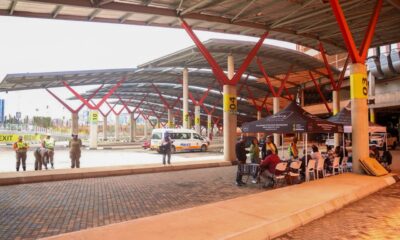Best of Johannesburg
When Cash Still Counts: Why ATMs Still Matter in 2025 South Africa

South Africa is speeding into a digital future. Scanning to pay, tapping to tip, and transferring by mobile have become the new normal in many urban settings. But while digital dominates in malls and metro hubs, cash still speaks the loudest in many parts of the country. From spaza shops to township taxis, the sound of coins and notes changing hands remains a familiar rhythm.
In 2025, South Africa’s relationship with money is layered. While financial institutions are scaling down ATM networks to reduce costs and boost digital convenience, many South Africans still rely on cash to get by. The ATM might be fading from Sandton high streets, but in the heart of Soweto, Mamelodi, and Mahikeng, it remains essential.
Who still needs cash?
Cash remains crucial in places where the informal economy thrives. In markets and roadside stalls, the idea of swiping for a R15 kota or paying by app for a photocopy does not make sense. Many small business owners avoid digital payments because of transaction fees and the extra admin. When your profit margin is tiny, even a two rand swipe fee can hurt. Customers often pay in coins or small notes because that is what they have. And for millions, that cash comes from an ATM.
Then there is the matter of budgeting. A growing number of households, especially those on tight budgets, withdraw a set amount each week to keep track of spending. Physical cash gives you a clearer sense of what you have and what you have left. When the envelope is empty, the spending stops. It is a practical, old-school method that works in a world filled with digital temptations.
Tips and gratuities also remain largely cash-based. Many service workers prefer cash in hand instead of delayed digital tips routed through employers or platforms. The immediacy of cash provides dignity and control. Whether it is a car guard at a shopping centre or a domestic worker who comes in once a week, small cash payments are still the norm.
Why ATMs are disappearing
Despite the ongoing demand for physical cash, major banks in South Africa have removed thousands of ATMs in recent years. The move is part of a broader push toward cost-saving, efficiency, and security. Cash logistics are expensive. Armed van deliveries, ATM maintenance, security threats, and vandalism all contribute to the decision to go digital.
Banks are not abandoning physical money altogether. Instead, they are shifting cash access into retailers, using point-of-sale cashback and supermarket-based ATMs to replace traditional standalone machines. But this shift assumes that everyone lives near a shopping centre or has access to transport. In many rural and township areas, this is not the case.
Power outages add another twist. During loadshedding, many digital systems go offline. ATMs with backup power, especially newer models, become critical. If your banking app crashes during Stage 6, a working ATM down the road might be your only way to buy bread or catch a taxi.
The growing digital divide
South Africa’s digital transformation is moving fast, but not everyone is keeping pace. Older adults, rural communities, and low-income earners often face challenges like weak internet, poor network coverage, or limited digital literacy. While digital payments offer speed and security, they can also leave some behind.
Even small businesses in townships have expressed concern. Going fully digital means higher fees, greater traceability, and pressure to formalise. For some, this could bring unexpected tax burdens. Others simply do not trust that digital money is as secure or as transparent as hard cash.
That does not mean people are resisting change. In fact, many are finding ways to blend the old and new. Using ATMs to top up mobile wallets, paying for online purchases with cash, and using USSD services on basic phones are just some of the workarounds.
Cash is not dead. It is adapting
Digital payments are here to stay. They are fast, often safer, and increasingly embedded in daily life. But the idea that cash is vanishing is an oversimplification. In 2025, cash remains a lifeline, a budgeting tool, and a trusted method of exchange for millions of South Africans.
ATMs, although fewer in number, still matter. They bridge the gap between formal banking and real-world survival. In an ideal future, South Africa will offer both digital access and cash options without forcing people to choose.
Because in this country, a single coin can still feed someone, fuel a hustle, or change a day.
Also read: Can Your Bank Deny You Service If You’re Not Online? Know Your Rights SA 2025
Follow Joburg ETC on Facebook, Twitter, TikT
For more News in Johannesburg, visit joburgetc.com
Featured Image: MyBroadband



























